Well Child Visit for Newborns
Medically reviewed by Drugs.com. Last updated on Aug 4, 2025.
Explore by milestone
What is a well child visit?
A well child visit is when your child sees a pediatrician to prevent health problems. Well child visits are used to track your child's growth and development. It is also a time for you to ask questions and to get information on how to keep your child safe. Write down your questions so you remember to ask them. Your child should have regular well child visits from birth to 17 years.
What development milestones may my newborn reach?
- Respond to sound, faces, and bright objects that are near him or her
- Grasp a finger placed in his or her palm
- Have rooting and sucking reflexes, and turn his or her head toward a nipple
- React in a startled way by throwing his or her arms and legs out and then curling them in
What can I do when my baby cries?
These actions may help calm your baby when he or she cries:
- Hold your baby skin to skin and rock him or her, or swaddle him or her in a soft blanket.
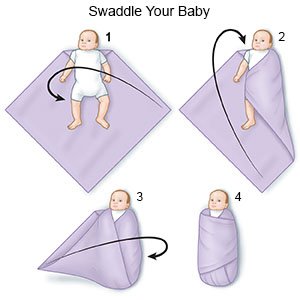
- Gently pat your baby's back or chest. Stroke or rub his or her head.
- Quietly sing or talk to your baby, or play soft, soothing music.
- Put your baby in his or her car seat and take him or her for a drive, or go for a stroller ride.
- Burp your baby to get rid of extra gas.
- Give your baby a soothing, warm bath.
What do I need to know about feeding my newborn?
The following are general guidelines. Talk to your pediatrician if you have any questions or concerns about feeding your newborn:
- Feed your newborn only breast milk or formula for 4 to 6 months. Do not give your newborn anything other than breast milk. He or she does not need water or any other food at this age.
- Feed your newborn 8 to 12 times each day. He or she will probably want to drink every 2 to 4 hours. Wake your baby to feed him or her if he or she sleeps longer than 4 to 5 hours. If your newborn is sleeping and it is time to feed, lightly rub your finger across his or her lips. You can also undress him or her or change his or her diaper. At 3 to 4 days after birth, your newborn may eat every 1 to 2 hours. Your newborn will return to eating every 2 to 4 hours when he or she is 1 week old.
- Your baby may let you know when he or she is ready to eat. He or she may be more awake and may move more. He or she may put his or her hands up to his or her mouth. He or she may make sucking noises. Crying is normally a late sign that your baby is hungry.
- Do not use a microwave to heat your baby's bottle. The milk or formula will not heat evenly and will have spots that are very hot. Your baby's face or mouth could be burned. You can warm the milk or formula quickly by placing the bottle in a pot of warm water for a few minutes.
- Your newborn will give you signs when he or she has had enough. Stop feeding him or her when he or she shows signs that he or she is no longer hungry. He or she may turn his or her head away, seal his or her lips, spit out the nipple, or stop sucking. Your newborn may fall asleep near the end of a feeding. If this happens, do not wake him or her.
- Do not overfeed your baby. Overfeeding means your baby gets too many calories during a feeding. This may cause him or her to gain weight too fast. Do not try to continue to feed your baby when he or she is no longer hungry.
What do I need to know about breastfeeding my newborn?
- Breast milk has many benefits for your newborn. Your breasts will first produce colostrum. Colostrum is rich in antibodies (proteins that protect your baby's immune system). Breast milk starts to replace colostrum 2 to 4 days after your baby's birth. Breast milk contains the protein, fat, sugar, vitamins, and minerals that your newborn needs to grow. Breast milk protects your newborn against allergies and infections. It may also decrease your newborn's risk for sudden infant death syndrome (SIDS).
- Find a comfortable way to hold your baby during breastfeeding. Ask your pediatrician for more information on how to hold your baby during breastfeeding.
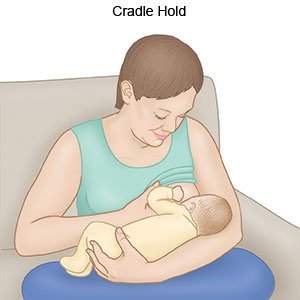
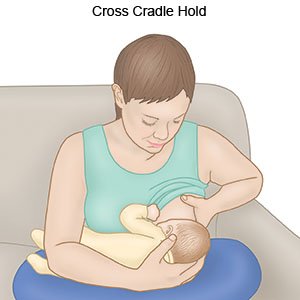
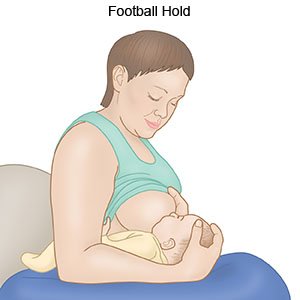
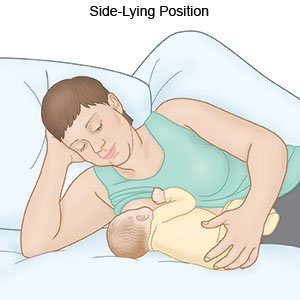
- Your newborn should have 6 to 8 wet diapers every day. The number of wet diapers will let you know that your newborn is getting enough breast milk. Your newborn may have 3 to 4 bowel movements every day. Your newborn's bowel movements may be loose.
- Do not give your baby a pacifier until he or she is 4 to 6 weeks old. The use of a pacifier at this time may make breastfeeding difficult for your baby.
- Get support and more information about breastfeeding your newborn.
- American Academy of Pediatrics
345 Park Boulevard
Itasca , IL 60143
Phone: 1- 800 - 433-9016
Web Address: http://www.aap.org
- La Leche League International
957 North Plum Grove Road
Schaumburg , IL 60173
Phone: 1- 847 - 519-7730
Phone: 1- 800 - 525-3243
Web Address: http://www.lalecheleague.org
- American Academy of Pediatrics
How do I help my baby latch on correctly?
Help your baby move his or her head to reach your breast. Hold the nape of his or her neck to help him or her latch onto your breast. Touch his or her top lip with your nipple and wait for him or her to open his or her mouth wide. Your baby's lower lip and chin should touch the areola (dark area around the nipple) first. Help him or her get as much of the areola in his or her mouth as possible. You should feel as if your baby will not separate from your breast easily. A correct latch helps your baby get the right amount of milk at each feeding. Allow your baby to breastfeed for as long as he or she is able.
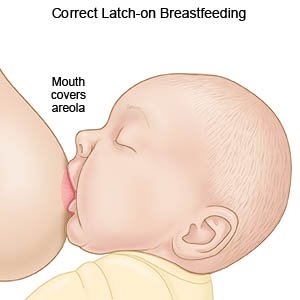 |
How do I know if my baby is latched on correctly?
- You can hear your baby swallow.
- Your baby is relaxed and takes slow, deep mouthfuls.
- Your breast or nipple does not hurt during breastfeeding.
- Your baby is able to suckle milk right away after he or she latches on.
- Your nipple is the same shape when your baby is done breastfeeding.
- Your breast is smooth, with no wrinkles or dimples where your baby is latched on.
What do I need to know about feeding my baby formula?
- Ask your baby's pediatrician which formula to feed your newborn. Your newborn may need formula that contains iron. The different types of formulas include cow's milk, soy, and other formulas. Some formulas are ready to drink, and some need to be mixed with water. Ask your pediatrician how to prepare your newborn's formula.
- Hold your newborn upright during bottle-feeding. You may be comfortable feeding your newborn while sitting in a rocking chair or an armchair. Put a pillow under your arm for support. Gently wrap your arm around your newborn's upper body, supporting his or her head with your arm. Be sure your baby's upper body is higher than his or her lower body. Do not prop a bottle in your newborn's mouth or let him or her lie flat during feeding. This may cause him or her to choke.
- Your newborn may drink about 2 to 4 ounces of formula at each feeding. Your newborn may want to drink a lot one day and not want to drink much the next.
- Do not add baby cereal to the bottle. Overfeeding can happen if you add baby cereal to formula or breast milk. You can make more if your baby is still hungry after he or she finishes a bottle.
- Wash bottles and nipples with soap and hot water. Use a bottle brush to help clean the bottle and nipple. Rinse with warm water after cleaning. Let bottles and nipples air dry. Make sure they are completely dry before you store them in cabinets or drawers.
How do I burp my newborn?
Burp your newborn when you switch breasts or after every 2 to 3 ounces from a bottle. Burp him or her again when he or she is finished eating. Your newborn may spit up when he or she burps. This is normal. Hold your baby in any of the following positions to help him or her burp:
- Hold your newborn against your chest or shoulder. Support his or her bottom with one hand. Use your other hand to pat or rub his or her back gently.
- Sit your newborn upright on your lap. Use one hand to support his or her chest and head. Use the other hand to pat or rub his or her back.
- Place your newborn across your lap. He or she should face down with his or her head, chest, and belly resting on your lap. Hold him or her securely with one hand and use your other hand to rub or pat his or her back.
How should I lay my newborn down to sleep?
It is very important to lay your newborn down to sleep in safe surroundings. This can greatly reduce his or her risk for SIDS. Tell grandparents, babysitters, and anyone else who cares for your newborn the following rules:
- Put your newborn on his or her back to sleep. Do this every time he or she sleeps (naps and at night). Do this even if your baby sleeps more soundly on his or her stomach or side. Your newborn is less likely to choke on spit-up or vomit if he or she sleeps on his or her back.

- Put your newborn on a firm, flat surface to sleep. Your newborn should sleep in a crib, bassinet, or cradle that meets the safety standards of the Consumer Product Safety Commission (CPSC). Do not let him or her sleep on pillows, waterbeds, soft mattresses, quilts, beanbags, or other soft surfaces. Move your baby to his or her bed if he or she falls asleep in a car seat, stroller, or swing. He or she may change positions in a sitting device and not be able to breathe well.
- Put your newborn to sleep in a crib or bassinet that has firm sides. The rails around your newborn's crib should not be more than 2⅜ inches apart. A mesh crib should have small openings less than ¼ of an inch.
- Put your newborn in his or her own bed. A crib or bassinet in your room, near your bed, is the safest place for your baby to sleep. Never let him or her sleep in bed with you. Never let him or her sleep on a couch or recliner.
- Do not leave soft objects or loose bedding in his or her crib. His or her bed should contain only a mattress covered with a fitted bottom sheet. Use a sheet that is made for the mattress. Do not put pillows, bumpers, comforters, or stuffed animals in his or her bed. Dress your newborn in a sleep sack or other sleep clothing before you put him or her down to sleep. Do not use loose blankets. If you must use a blanket, tuck it around the mattress.
- Do not let your newborn get too hot. Keep the room at a temperature that is comfortable for an adult. Never dress him or her in more than 1 layer more than you would wear. Do not cover your baby's face or head while he or she sleeps. Your newborn is too hot if he or she is sweating or his or her chest feels hot.
- Do not raise the head of your newborn's bed. Your newborn could slide or roll into a position that makes it hard for him or her to breathe.
What can I do to keep my newborn safe?
- Do not give your baby medicine unless directed by his or her pediatrician. Ask for directions if you do not know how to give the medicine. If your baby misses a dose, do not double the next dose. Ask how to make up the missed dose. Do not give aspirin to children younger than 18 years. Your child could develop Reye syndrome if he or she has the flu or a fever and takes aspirin. Reye syndrome can cause life-threatening brain and liver damage. Check your child's medicine labels for aspirin or salicylates.
- Never shake your newborn to stop his or her crying. This can cause blindness or brain damage. It can be hard to listen to your newborn cry and not be able to calm him or her down. Place your newborn in his or her crib or playpen if you feel frustrated or upset. Call a friend or family member and tell them how you feel. Ask for help and take a break if you feel stressed or overwhelmed.
- Never leave your newborn in a playpen or crib with the drop-side down. Your newborn could fall and be injured. Make sure that the drop-side is locked in place.
- Always keep one hand on your newborn when you change his or her diapers or dress him or her. This will prevent him or her from falling from a changing table, counter, bed, or couch.
- Always put your newborn in a rear-facing car seat. The car seat should always be in the back seat. Make sure you have a safety seat that meets the federal safety standards. It is very important to install the safety seat properly in your car and to always use it correctly. The harness and straps should be positioned to prevent your baby's head from falling forward. Ask for more information about newborn safety seats.
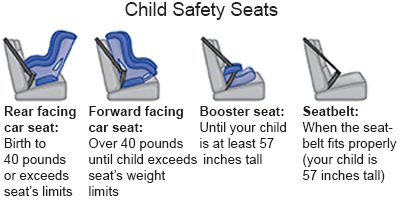
- Do not smoke near your newborn. Do not let anyone else smoke near your newborn. Do not smoke in your home or vehicle. Smoke from cigarettes or cigars can cause asthma or breathing problems in your newborn.
- Take an infant CPR and first aid class. These classes will help teach you how to care for your baby in an emergency. Ask your baby's pediatrician where you can take these classes.
What can I do to care for my newborn's skin?
- Sponge bathe your newborn with warm water and a cleanser made for a baby's skin. Do not use baby oil, creams, or ointments. These may irritate your baby's skin or make skin problems worse. Wash your baby's head and scalp every day. This may prevent cradle cap. Do not bathe your baby in a tub or sink until his or her umbilical cord has fallen off. Ask for more information on sponge bathing your baby.
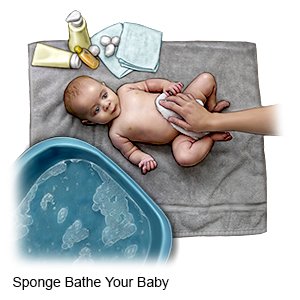
- Use moisturizing lotions on your newborn's dry skin. Ask your pediatrician which lotions are safe to use on your newborn's skin. Do not use powders.
- Prevent diaper rash. Change your newborn's diaper frequently. Clean your newborn's bottom with a wet washcloth or diaper wipe. Do not use diaper wipes if your baby has a rash or circumcision that has not yet healed. Gently lift both legs and wash his or her buttocks. Always wipe from front to back. Clean under all skin folds and between creases. Let his or her skin air dry before you replace his or her diaper. Ask your newborn's pediatrician about creams and ointments that are safe to use on his or her diaper area.
- Use a wet washcloth or cotton ball to clean the outer part of your newborn's ears. Do not put cotton swabs into your newborn's ears. These can hurt his or her ears and push earwax in. Earwax should come out of your newborn's ear on its own. Talk to your baby's pediatrician if you think your baby has too much earwax.
- Keep your newborn's umbilical cord stump clean and dry. Your baby's umbilical cord stump will dry and fall off in about 7 to 21 days, leaving a bellybutton. If your baby's stump gets dirty from urine or bowel movement, wash it off right away with water. Gently pat the stump dry. This will help prevent infection around your baby's cord stump. Fold the front of the diaper down below the cord stump to let it air dry. Do not cover or pull at the cord stump. Call your newborn's pediatrician if the stump is red, draining fluid, or has a foul odor.
- Keep your newborn boy's circumcised area clean. Your baby's penis may have a plastic ring that will come off within 8 days. His penis may be covered with gauze and petroleum jelly. Gently blot or squeeze warm water from a wet cloth or cotton ball onto the penis. Do not use soap or diaper wipes to clean the circumcision area. This could sting or irritate your baby's penis. Your baby's penis should heal in 7 to 10 days.
- Keep your newborn out of the sun. Your newborn's skin is sensitive. He or she may be easily burned. Cover your newborn's skin with clothing if you need to take him or her outside. Keep him or her in the shade as much as possible. Only apply sunscreen to your baby if there is no shade. Ask your pediatrician what sunscreen is safe to put on your baby.
How should I clean my newborn's eyes and nose?
- Use a rubber bulb syringe to suction your newborn's nose if he or she is stuffed up. Point the bulb syringe away from his or her face and squeeze the bulb to create a vacuum. Gently put the tip into one of your newborn's nostrils. Close the other nostril with your fingers. Release the bulb so that it sucks out the mucus. Repeat if necessary. Boil the syringe for 10 minutes after each use. Do not put your fingers or cotton swabs into your newborn's nose.
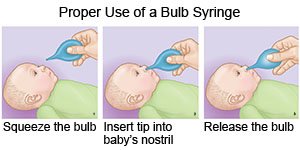
- Massage your newborn's tear ducts as directed. A blocked tear duct is common in newborns. A sign of a blocked tear duct is a yellow sticky discharge in one or both of your newborn's eyes. Your newborn's pediatrician may show you how to massage your newborn's tear ducts to unplug them. Do not massage your newborn's tear ducts unless his or her pediatrician says it is okay.
What can I do to prevent my newborn from getting sick?
- Wash your hands before you touch your newborn. Use an alcohol-based hand sanitizer or soap and water. Wash your hands after you change your newborn's diaper and before you feed him or her.

- Ask all visitors to wash their hands before they touch your newborn. Have them use an alcohol-based hand sanitizer or soap and water. Tell friends and family not to visit your newborn if they are sick.
- Keep your newborn away from crowded places. Do not bring your newborn to crowded places such as the mall, restaurant, or movie theater. Your newborn's immune system is not strong and he or she can easily get sick.
What can I do to care for myself and my family?
- Sleep when your baby sleeps. Your baby may feed often during the night. Get rest during the day while your baby sleeps.
- Ask for help from family and friends. Caring for a newborn can be overwhelming. Talk to your family and friends. Tell them what you need them to do to help you care for your baby.
- Take time for yourself and your partner. Plan for time alone with your partner. Find ways to relax such as watching a movie, listening to music, or going for a walk together. You and your partner need to be healthy so you can care for your baby.
- Let your other children help with the care of your newborn. This will help your other children feel loved and cared about. Let them help you feed the baby or bathe him or her. Never leave the baby alone with other children.
- Spend time alone with your other children. Do activities with them that they enjoy. Ask them how they feel about the new baby. Answer any questions or concerns that they have about the new baby. Try to continue family routines.
- Join a support group. It may be helpful to talk with other new parents.
What do I need to know about my newborn's next well child visit?
Your newborn's pediatrician will tell you when to bring him or her in again. The next well child visit is usually at 1 or 2 weeks. Contact your newborn's pediatrician if you have any questions or concerns about your baby's health or care before the next visit. Your newborn may need vaccines at the next well child visit. Your provider will tell you which vaccines your newborn needs and when he or she should get them.
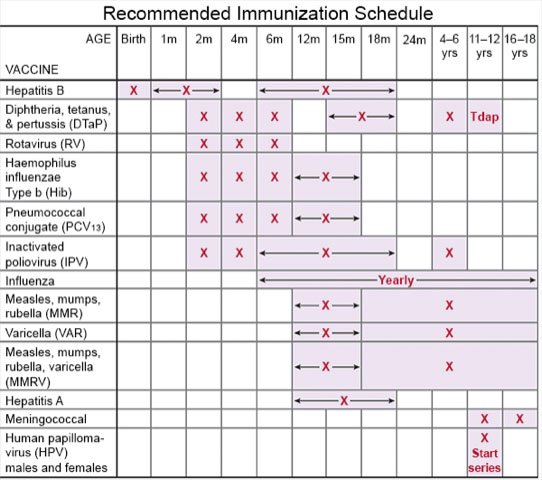 |
Care Agreement
You have the right to help plan your baby's care. Learn about your baby's health condition and how it may be treated. Discuss treatment options with your baby's healthcare providers to decide what care you want for your baby. The above information is an educational aid only. It is not intended as medical advice for individual conditions or treatments. Talk to your doctor, nurse or pharmacist before following any medical regimen to see if it is safe and effective for you.© Copyright Merative 2025 Information is for End User's use only and may not be sold, redistributed or otherwise used for commercial purposes.
Further information
Always consult your healthcare provider to ensure the information displayed on this page applies to your personal circumstances.
